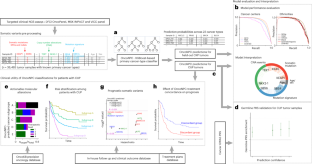2023-08-07 マサチューセッツ工科大学(MIT)
◆このモデルにより、約900人の患者のデータセットで少なくとも40%の謎の発生源を持つ腫瘍を正確に分類し、ゲノムに基づく治療の選択肢を増やすことに成功しました。
<関連情報>
- https://news.mit.edu/2023/ai-model-can-help-determine-where-patients-cancer-arose-0807
- https://www.nature.com/articles/s41591-023-02482-6
原発不明がんにおける遺伝学に基づく分類と治療効果予測のための機械学習 Machine learning for genetics-based classification and treatment response prediction in cancer of unknown primary
Intae Moon,Jaclyn LoPiccolo,Sylvan C. Baca,Lynette M. Sholl,Kenneth L. Kehl,Michael J. Hassett,David Liu,Deborah Schrag & Alexander Gusev
Nature Medicine Published:07 August 2023
DOI:https://doi.org/10.1038/s41591-023-02482-6

Abstract
Cancer of unknown primary (CUP) is a type of cancer that cannot be traced back to its primary site and accounts for 3–5% of all cancers. Established targeted therapies are lacking for CUP, leading to generally poor outcomes. We developed OncoNPC, a machine-learning classifier trained on targeted next-generation sequencing (NGS) data from 36,445 tumors across 22 cancer types from three institutions. Oncology NGS-based primary cancer-type classifier (OncoNPC) achieved a weighted F1 score of 0.942 for high confidence predictions (≥0.9) on held-out tumor samples, which made up 65.2% of all the held-out samples. When applied to 971 CUP tumors collected at the Dana-Farber Cancer Institute, OncoNPC predicted primary cancer types with high confidence in 41.2% of the tumors. OncoNPC also identified CUP subgroups with significantly higher polygenic germline risk for the predicted cancer types and with significantly different survival outcomes. Notably, patients with CUP who received first palliative intent treatments concordant with their OncoNPC-predicted cancers had significantly better outcomes (hazard ratio (HR) = 0.348; 95% confidence interval (CI) = 0.210–0.570; P = 2.32×10-52.32×10-5). Furthermore, OncoNPC enabled a 2.2-fold increase in patients with CUP who could have received genomically guided therapies. OncoNPC thus provides evidence of distinct CUP subgroups and offers the potential for clinical decision support for managing patients with CUP.


